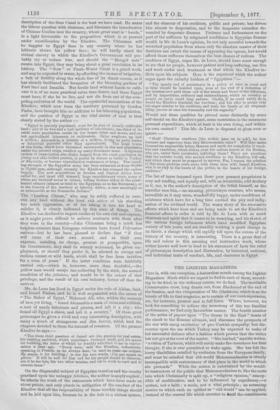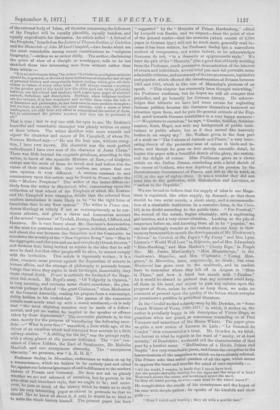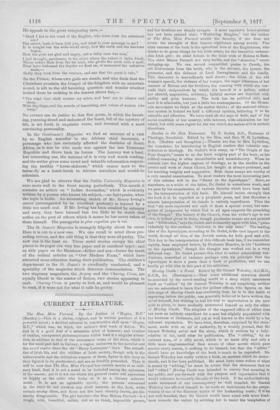THE LIGHTER MAGAZINES.
Tills is, with one exception, a featureless month among the Lighter Magazines. Much which we expect to find in each of them, accord- ing to its kind, in the ordinary course, we do find. The inevitable Conservative crow, long drawn out, from Blackwood at the end of the Session, and the vituperation of Mr. Gladstone, which is as the breath of life to that magazine, as to certain of our contemporaries, are, for instance, present and in full force. Where, however, we look for something to relieve the monotony of this too familiee performance, we find only flavourless matter. The fourth number of the series of papers upon "The Storm in the East" treats of the check to the Russian advance, and discusses the prospects of the war with smug exultation of pro-Turkish sympathy, but dis- courses upon the use which Turkey may be expected to make of her successful defence after a fashion which proves that the writer has not got at the root of the matter. "She has had," says the writer, " a vision of Tartarus, which will surely make fire-insurance her first thought, if she is ever permitted to wake again. She has felt the heavy disabilities entailed by exclusion from the European family, and must be satisfied that old-world Mahommedanism is utterly incompatible with maintenance of that place in the world to which she pretends." While the notion is entertained by the would. be instructors of the public that Mahommedanism is, like the sects into which Christianity is split up, a "religious opinion," suscep- tible of modification, and to be influenced by expediency,—a system, not a faith ; a mode, not a vital principle ; an actuating motive to which such an epithet as " old-world " can be applied, instead of the central life which accretes to itself the constituents of the external body of Islam, all theories concerning the followers of the Prophet will be equally plausible, equally baseless, and equally unprofitable for discussion. An article called " A School of the Prophets," founded on the Letters of Thomas Erskine of Linlathen and the Memorials of John M,Leod Campbell,—two books which are the most remarkable among recent contributions to "religious biography,"—strikes us as rather chilly. The author, disclaiming the point of view of a disciple or worshipper, tells us he has sketched these two interesting men from without rather than from within :- "it is an unfortunate thing,"he writes," that letters on religious subjects should be, in general, so devoid of those indioations of character and scraps of personal history and recognisable human feeling which give all their charm to letters of every other kind. It will always remain a mystery to the greater part of the world how the other part can write, privately between one individual and another, such pages upon pages of abstract remark, definition, and description. Perhaps, when religious matters are the subject, it is less wonderful and terrible than when the talk is of literature and philosophy, as has boon seen in sozne modern examples ; but we fear, in any ease, that our mind shrinks, with a sense of utter inadequacy, not only from any effort to comprehend the matter of them, but to understand the greater mystery how they can be produced at
all."
That is true ; but to any one with the eyes to see, Mr. Erskine's beautiful and remarkable character was plainly written on many of these letters. The writer sketehes with more warmth and vigour the character and career of Dr. Campbell, of whom Dr. Norman Macleod says :—" He was the best man, without.excep- tion, I have ever known. His character was the most perfect embodiment I have over seen of the character of Jesus Christ." There was little beyond his exquisite goodness, according to this writer, to know of the apostolic Minister of Row,—of hinipsho always saw the souls of those he loved, and had before him the vision of their eternal life. Our readers are aware that our Own opinion is very different. A curious contsast to and commentary upon this article may be found in Fraser, under the title " Modern Prophets." The writer of the latter differs en- tirely from the writer in Blackwood, who, commenting upon the extinction of that school of the Prophets of which Mr. Erskine -and Dr. Campbell were examples, thinks that the rebound from modern materialism is more likely to be "to the rigid force of fanaticism than to any finer system." The writer in Fraser con- demns theology as utterly if not so contemptuously as he con- demns atheism, and gives a clever and humourous account of the several " systems " of Tyndall, Huxley, Haeckel, Clifford, and Harrison. He is very funny about Mr. Harrison's denunciation of the wish for personal survival, as "gross, indolent, and selfish," and about the war between the Scientists and the Comteista ; he translates the worship of the "New Supreme Bing" into "Man in the Aggregate, and (for you and me and everybody) Death forever," and declares that, being invited to rejoice in the idea that he will soon be dead, but that other people will be alive, he cannot comply
with the invitation. This article is vigorously written ; it is a 'clear, common-sense protest against the dogmatism of science in human affairs, and the attempt of philosophy to persuade human beings that when they aspire to their birthright, immortality, they mean eternal death. Fraser is certainly the liveliest of the Maga- zines this month. Mr. Boyd's essay, "Of Vulgarity in Opinion," is very amusing, and contains some choice anecdotes ; the plea- santest perhaps is that of "time great Chalmers," when Moderator of the General Assembly, reading his prayers from a manuscript, deftly hidden in his coeked-hat. The parson of the numerous initials must needs wind up with a moral sentiment,—it is only that " the most slighting mention may be made of a fellow- mortal, and yet no malice be implied in the speaker or offence taken by those depreciated." The inevitable platitude is, in this .case, merely for the purpose of introducing the following anec- dote :—" What is your fare ?" was asked, a little while ago, of the driver of an omnibus which had conveyed four mortals to a little railway-station. "A shilling for the lot," was the prompt reply, with a sharp glance at the persons indicated. The "lot" con- sisted of Canon Liddon, the Earl of Strathmore, Mr. Malcolm MaeColl, and one anonymous obscurity. The "anonymous Obscurity," we presume, was "A. K. H. B."
Professor Seeley, in Macmillan, endeavours to waken us up by a remonstrance, which we believe to be entirely just and called for, against our heinous ignorance of and indifference to the modern history of Prussia and Germany. He does not ask us plainly whether we are not ashamed of ourselves, but he proves, in his own clear and trenchant style, that we ought to be ; and more- over, he puts so much of the history which he wants us to study tato his very interesting paper as almost to persuade us that we Should hke to know all about it, if only he would be so kind as to write the whole history himself. The present paper has been " suggested " by the "Memoirs of Prince Hardenberg," edited by Leopold von Ranke, and we suspect—from the point of view of the general reader—that the memoirs (which consist of 2,000 pages in German type) will not be much more generally read be- cause it has been written, for Professor Seeley has a marvellous method of compression, and writes history, as he acknowledges Germans do not, "in a dramatic or epigrammatic style." We have the pith of the "Memoirs," plus a good deal of kindly scolding from the Professor, much persuasive demonstration of the interest of events and individuals, several brief pen-and-ink portraits, some admirable criticism, and a summary of th e two movements, legislative and popular, which effected the transformation of Prussia between 1807 and 1818, which is like one of Macaulay's pictures of an epoch. "This chapter has commonly been thought uninviting," the Professor confesses, but he hopes we will all conquer that prejudice, and go honestly for German history. He acknow- ledges that hitherto we have had some excuse for neglecting German politics, because the Germans themselves bestowed no attention upon them, and he puts the general attitude of the Eng- lish mind towards German notabilities in a very happy sentence : —" Wepicture to ourselves," he says, " Goethe, Schiller, Schleier- macher, Kant, Hegel, not with any background of public insti- tutions or public affairs, but as if they moved like heavenly bodies in an empty sky." Mr. Wallace gives, in the first part of a work on "The Colours of Animals and Plants," a very inter- esting theory of the protective uses of colour in birds and in- sects, and though he goes on into strictly scientific detail, he begins this paper with a beautiful sketch of the glory, the variety, and the delight of colour. Miss Phillinnore gives us a clever article on the Italian Drama, concluding with a brief sketch of the career of Goldoni, who was deprived of his pension by the Revolutionary Government of France and left to die in want, in 1793, at the age of eighty-three. It was a wonder they did not send him to the guillotine, with Malesherbes and Lavoisier, as "useless to the Republic."
We are bound to believe that the supply of tales in our Maga- zines is regulated, like other supply, by demand ; so that there should be two serial novels, a short story, and a recommenda- tion of a charitable institution in a narrative form, in the Corn-
hill, is no doubt according to the public taste. "For Percival," the second of the serials, begins admirably, with a captivating girl heroine, and a very clever situation. Looking at the pile of magazines before us, and knowing them all to be "popular," we
can but admiringly wonder at the readers who can keep in their memory from month to month the developments of Mr. Blackmon's " Erema" in Cerahill, of Mr. Payu's "By Proxy" and Mrs. Lynn Linton's "World Well Lost" in Belgravia, and of Mrs. Edwardes's
"Blue-Stocking," and Miss Mather's " Cherry Ripe," in Temple Bar. Mr. Justin MacCarthy's "Miss Misanthrope," in the Gentleman's Magaz7ine, and Mrs. Oliphant's " Young Mus- grave," in Macmillan, have, respectively, no rivals ; but even 131ackwood has gone over to the multitude, and its readers have to remember where they left off in August in "Mine is Thine," and how it fared last month with "Pauline." As it would be absurd to pretend that any reviewer could keep all these in his head, and unjust to pass any opinion upon the
progress of them, unless he could so keep them, we make no comment at present upon the quality of the fiction which occupies
so prominent a position in periodical literature.
In the Corn/till we find a dainty essay by Mr. Do wden, on "Some French Writers of Verse, 1830-1877," in which, it strikes us, the author is peculiarly happy in his description of Victor Hugo, as grandiose when not grand, as sometimes reminding us of Paul Veronese and sometimes of the Mus6e Wiertz. The paper gives us quite a new notion of Leconte de Lisle ; "Le Sommeil du Condor" thus commented is a treat. Mr. Dowden is, we think,
too lenient to what he regards as the want of "sanity, or at least serenity," of Baudelaire ; we should call the characteristics of that poet by a harsher name. "Meditations of a Hindu Prince and Sceptic" is a very remarkable poem, and forms the exception to the featurelesaness of the magazines to which we have already referred. The Prince asks that awful question of all the ages, which seems to oppress the heart and trouble the mind of ours especially :—
"Alt the world, I wonder, in lands that I never have trod, Are the people eternally seeking for the signs and the steps of a God ? Westward across the ocean, and northward ayont the snow,
Do they all stand gazing, as ever,—and what do the wisest know ?"
He recapitulates the creeds of his countrymen and the hopes of his race with simple pathos; he speaks of his kinsfolk and their
gods :—
" Ever I watch and worship ; they sit with a marble face."
He appeals to the great conquering race,—
" Shall I list to the word of the English, who come from the uttermost sea ?
The secret, bath it been told you, and what is your message to me ? It is nought but the wide-world story, how the earth and the heaven began,
How the gods are glad and angry, and a deity once was man:
I had thought, perchance, in the cities where the rulers of India dwell, Whose orders flash from the far land, who girdle the earth with a spell, They have fathomed the depths we float on, or measured the unknown Sadly they turn from the venture, and say that the quest is vain."
So the Prince, whose own gods are dumb, and who finds that the Christians proclaim the Gospel of the kingdom with an uncertain sound, is left to the old haunting question and wonder whether indeed there be nothing in the heaven above but,—
" The wind that shall scatter my ashes, and bear me to silence and
sleep, With the dirge, and the sounds of lamenting, and voices of women who weep."
No extract can do justice to this fine poem, in which the haunt- ing, yearning dread and sadness of the heart, full of the mystery of life, is set forth in exquisite verse, and invested with a most convincing personality.
In the Gentleman's Magazine we find an account of a visit by an English traveller to the African chief Secocceni, a personage who has materially affected the destinies of South Africa, as it was he who made war against the late Transvaal Republic and drove back its forces. The journey was a hard, but interesting one, the account of it is very well worth reading, and the writer gives some novel and valuable information respect- ing the terrible "horse-sickness," which comes next to the tsetse-fly as a heart-break to African travellers and would-be colonists.
We are glad to observe that the Dublin University Magazine is once more well to the front among periodicals. This month it contains an article on " Indian Anomalies," which is evidently written by a person who knows his subject,—no light praise, when the topic is India. An interesting sketch of Mr. Henry Irving'e career (accompanied by an excellent portrait) is injured by a little too much zeal. If Mr. Irving has been assailed by calumny and envy, they have harmed him too little to be worth that notice on the part of others which it seems he has never taken of them himself. His panegyrist is plus royaliste qua Ic mi.
The Si. James's Magazine is strangely fidgetty about its cover. Hero it is out in a new one. We can recall to mind three pre- ceding covers, and the odd thing is that they were all pretty. The new one is the least so. Three serial stories occupy the chief places in its pages (on very fine paper and in excellent type) ; and an able paper on the Marstons—father and son—forms the tenth of the critical articles on "Our Modern Poets," which have attracted some attention during their publication. The children's department in the St. James's is excellently conducted, and a speciality of the magazine which deserves commendation. The two sixpenny magazines, the Argosy and the Charing Cross, are equally liberal in the matter of fiction, two stories appearing in each. Charing Cross is pretty to look at, and would be pleasant to read, if it were not for what it calls its poetry.
































 Previous page
Previous page